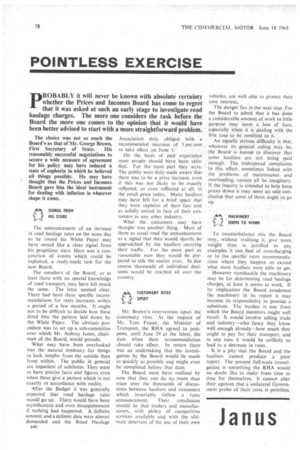POINTLESS EXERCISE
Page 80

If you've noticed an error in this article please click here to report it so we can fix it.
PROBABLY it will never be known with absolute certainty whether the Prices and Incomes Board has come to regret that it was asked at such an early stage to investigate road haulage charges. The more one considers the task before the Board the more one comes to the opinion that it would have been better advised to start with a more straightforward problem.
The choice was not so much the Board's as that of Mr. George Brown, First Secretary of State. His reasonably successful negotiations to secure a wide measure of agreement for his policy may have induced a state of euphoria in which he believed all things possible. He may have thought that the Prices and Incomes Board gave him the ideal instrument for dealing with inflation in whatever shape it came.
OSIGNAL FROM HIS STARS
[he announcement of an increase in road haulage rates on the same day as he issued his White Paper may have semed like a clear signal from his propitious stars. Here was a conjunction of events which could be exploited, a ready-made task for the new Board.
The members of the Board, or at least those with no special knowledge of road transport, may have felt much the same. The issue seemed clear. There had been three specific recommendations for rates increases within a period of a few months. It ought not to be difficult to decide how, these fitted into the pattern laid down by the White Paper. The obvious procedure was to set up a sub-committee over which Mr. Aubrey Jones, chairman of the Board, would preside.
What may have been overlooked was the natural tendency for things to look simpler from the outside than from within. The public in general are impatient of subtleties. They want to have precise facts and figures even when these give a picture which is not exactly in accordance with reality.
After the Budget it was generally expected that road haulage rates would go up. There would have been mystification and even disappointment if nothing had happened. A definite amount and a definite date were almost demanded and the Road Haulage 1346 Association duly obliged with a recommended increase of 5 per cent to take effect on June 1.
On the basis of past experience most people should have been satisfied. For the Most part they were. The public were duly made aware that there was to be a price increase, even if this was not likely to be .exactly reflected, or even reflected at all, in the'retail price index. Many hauliers may have felt for a brief space that they were captains of their fate and as solidly united in face of their customers as any other industry.
What the customers may have thoughrwas another. thing. Most of them as usual read the announcement as a signal that they would shortly be approached by the hauliers 'carrying their traffic. For the most part as reasonable men they would be prepared to talk the matter over. In due course thousands of individual decisions would be reached all over the country.
CUSTOMARY RITES UPSET
Mr; Brown's intervention upset the customary rites. At the request of Mr. Tom Fraser, the Minister of Transport, the RHA agreed to postpone, until June 29 at the latest, the date when their recommendation should take effect. In return there was an undertaking that the investigation by the Board would be made as quickly as possible and might even be completed before that date.
The Board must have realized by now that they can do no more than trace over the thousands of discussions between hauliers and customers which invariably follow a rates announcement. Their conclusion should be that traders and manufacturers, with plehty of competitive services available and with the ultimate deterrent of the use of their own vehicles, are well able to protect their own interests.
The danger lies in the next step. For the Board to admit that it has done a considerable amount of work to little purpose may seem a loss of face, especially when it is dealing with the first case to be remitted to it.
An equally serious difficulty is that, whatever its general ruling may be. the Board is bound to discover that some hauliers are not being paid enough. The widespread complaints• to this effect, sometirries linked with the problems of maintenance and overloading, cannot all be imaginary. If the inquiry is intended to help keep prices down it may seem an odd conclusion that some of them ought to go up.
MACHINERY SEEMS TO WORK
To counterbalance this the Board may, without realising it, give more weight than is 'justified to any examples it can find of overcharging or to the specifiC rates recommendations where they happen to exceed what most hauliers were able to get.
However ramshackle the machinery may be for determining road haulage charges, at least it seems to work. If by implication the Board condemns the machinery in its report it may become its responsibility to provide a substitute. The burden is one from which the Board members might well recoil It would involve telling trade and industry—who fancy they know well enough already—how much they ought to pay for their transport, and in any case it would be unlikely to lead to a decrease in rates.
It is a pity that the Board and the hauliers cannot produce a joint report. The present full-scale investigation is something the RHA would no doubt like to make from time to time for themselves. It cannot alter their opinion that a unilateral Government probe of their rates is pointless.
Janus




































































































































